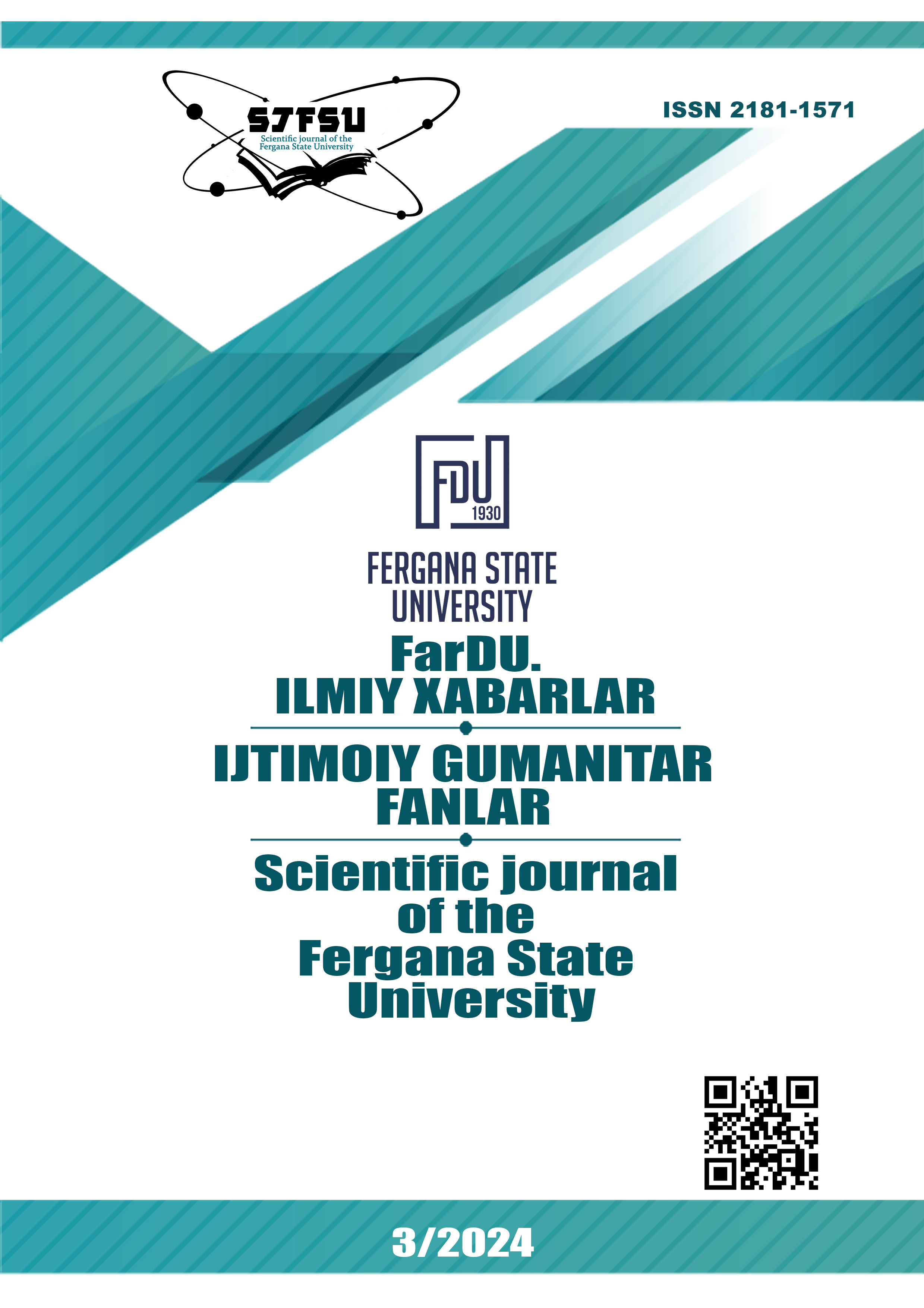FACTORS FOR IMPROVING ECOLOGICAL EDUCATION
Keywords:
ekologik madaniyat, atrof-muhit, ekologik ta’lim va tarbiya, ekologik xavfsizlik, olam, tabiat va insonlarAbstract
The article considers the need to improve the theoretical foundations of environmental education and upbringing in accordance with the requirements of the time based on international experience and national minimalism. The main purpose of the proposed qualities in the context of the global environmental crisis is to foster an ecological worldview based on new manners and ethics corresponding to the level of civilization of the XXI century and strong anthropogenic influences threatening nature. Currently, the introduction of ecological culture into the educational process on the basis of an integrative approach and the conclusion of the effectiveness of environmental education to a new level on this basis is becoming relevant.
References
O‘zbekiston Respublikasining 2020-yil 23-sentyabrdagi O‘RQ-637-sonli “Taʼlim to‘g‘risidagi” Qonuni. https://lex.uz/docs/5013007.
O‘zbekiston Respublikasi Prezidentining 2021-yil 30-dekabrdagi PQ-76-son “Atrof-muhitni muhofaza qilish hamda ekologik nazorat sohasidagi davlat organlari faoliyatini tashkil etish chora-tadbirlari to‘g‘risida” gi qarori.
O‘zbekiston Respublikasi Prezidentining 2017-yil 21-aprelda imzolangan “Ekologiya va atrof-muhitni muhofaza qilish sohasida davlat boshqaruvi tizimini takomillashtirish to‘g‘risida”gi PF-5024-sonli Farmoni.
Зубарев А.Е. Развитие экологического образования в 90-е годы XX – начале XXI в.в. // Экологическое образование на пороге «РИО + 10»: VIII Междунар. конф. по эколог, образованию: Тез. докл. – М., 2002. – Ч. I. – С. 67- 72.
Tojiboyev M. U., Uzoqjonova M. D. Q. Farg‘ona vodiysida tarqalgan ruderal shifobaxsh o‘simliklar, ularning tarqalishi va ahamiyati //Science and Education. – 2023. – Т. 4. – №. 8. – С. 101-107.
Uzoqjonova M. D. Q. Inson salomatligida dorivor o’simliklarning xususiyatlari //Science and Education. – 2023. – Т. 4. – №. 7. – С. 38-42.
Uzoqjonova, M. D. qizi. (2024). Baliqlar va ularning ekologik ahamiyati. Science and Education, 5(1), 13–17. Retrieved from https://openscience.uz/index.php/sciedu/article/view/6556.
Mirzakarimova M. M. The Necessity to Develop Students’ Entrepreneurial Skills in English Classes //Telematique. – 2022. – С. 7128-7131.
Mirzakarimova, M. M., & Uzoqjonova, M. D. qizi. (2023). Oʻzbekistonda chiqindilarni qayta ishlash muammolarini oʻrganish va bartaraf qilish. Science and Education, 4(11), 78–83. Retrieved from https://www.openscience.uz/index.php/sciedu/article/view/6393.
Mirzakarimova M. EFFECTIVENESS OF STUDENTS'ENTREPRENEURIAL SKILLS DEVELOPMENT THROUGH CLIL TECHNOLOGIES //Академические исследования в современной науке. – 2023. – Т. 2. – №. 8. – С. 92-94.
Madaminjonovna M. M. Innovative Methods and Tools for Developing Students' Entrepreneurial Skills Using CLIL Technologies //International Journal of Human Computing Studies. – 2023. – Т. 5. – №. 3. – С. 15-17.
Мирзакаримова М. М. ESSENTIAL COMPOSITION OF ENTREPRENEURSHIP FUNCTIONAL LITERACY //INTERNATIONAL SCIENTIFIC AND TECHNICAL JOURNAL “INNOVATION TECHNICAL AND TECHNOLOGY”. – 2020. – Т. 1. – №. 1. – С. 63-65.
Mirzakarimova M. M., Uzoqjonova M. D. Q. Scientific and pedagogical activity of Imam al-Bukhari //Science and Education. – 2023. – Т. 4. – №. 12. – С. 321-324.
Mirzakarimova M. M. et al. “Avesto” va pedagogik fikrlar rivoji //Science and Education. – 2024. – Т. 5. – №. 2. – С. 224-228.
Downloads
Published
Issue
Section
License
Copyright (c) 2024 Scientific journal of the Fergana State University

This work is licensed under a Creative Commons Attribution-NonCommercial-NoDerivatives 4.0 International License.
How to Cite
Most read articles by the same author(s)
- , , , DETERMINATION OF THE COMPOSITION AND QUANTITY OF MACRO- AND MICROELEMENTS OF THE PLANT GERANIUM COLLINUM , Scientific journal of the Fergana State University: No. 3 (2023): FarDU ilmiy xabarlari jurnali (Aniq va tabiiy fanlar)
- Madaminjonovna, O‘QUVCHILARDA TADBIRKORLIK TUSHUNCHALARINI RIVOJLANTIRISHNING DIAGNOSTIK TAHLILI , Scientific journal of the Fergana State University: No. 4 (2025): FarDU. Ilmiy xabarlar jurnali (Pedagogika)

